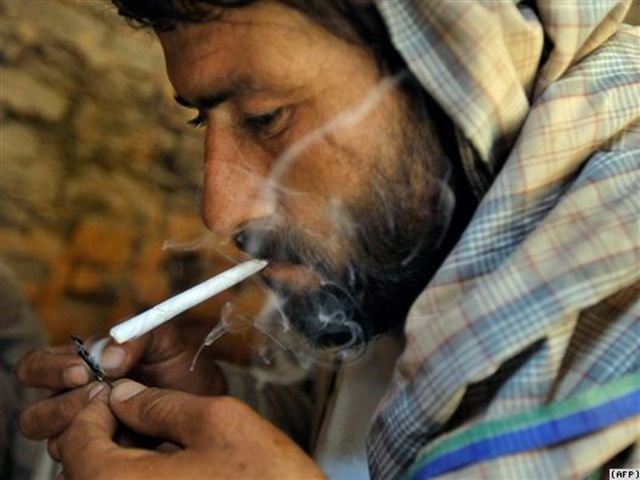
Taliban Spokesman Discusses Relations with al-Qaeda and Opium Production in Afghanistan
Publication: Terrorism Monitor Volume: 8 Issue: 25
By:

Taliban spokesman Qari Yusuf Ahmadi recently gave an interview to the pan-Arab newspaper Asharq al-Awsat in which he discussed the Taliban’s relations with al-Qaeda, the sources of opium production in Afghanistan, and the impact of the arrest of the second man in the Taliban leadership, Mullah Abdul Ghani Baradar (Asharq al-Awsat, June 10). In the internet-conducted interview, the Taliban spokesman answered questions addressed originally to the leader of the Taliban, Mullah Omar, who was said to have been too busy to participate in the online interview. Ahmadi’s interview was widely discussed in jihadi internet forums, where it received a mixed reaction.
Mullah Baradar is considered responsible for reviving and reorganizing the Taliban’s jihadi forces in Afghanistan in 2003. Mullah Baradar’s duties covered a wide range of Taliban activities such as funding, strategic planning, and the conduct of political and military operations. Baradar also headed the first Shura (consultative) council set up by the Taliban. Under Baradar, the Shura council released a jihadi organizational manual that examined past mistakes committed by the mujahideen during the Soviet occupation and urged an unrelenting fight against the enemy. Mullah Hamad Allah, a Taliban intelligence operative in Ghazni region, was cited as saying, "Mullah Baradar is not an extremist like the rest of the Taliban leaders. In any possible peace negotiations, he is the right man to talk to" (almokhtsar.com February 18).
Ahmadi claimed the Taliban is in control of three quarters of Afghanistan and rules Kabul and Kandahar 21 hours a day. Asked whether there are talks ongoing between the Taliban and Afghan president Hamid Karzai in the Maldives Islands—and pressed as to what transpired in the Jeddah talks conducted last year under the auspices of Saudi Arabia’s King Abdullah—Ahmadi said peace negotiations with Afghani president Hamid Karzai are being conducted by ex-Taliban leaders who have been expelled from the movement (see Terrorism Monitor, February 12).
On the arrest in Karachi last February of Mullah Abdul Ghani Baradar, Ahmadi said any information Baradar might reveal to his interrogators is outdated and harmless to the Taliban “because the Taliban made comprehensive tactical changes since the arrest." The impact of the arrest was exaggerated by the western media in order to undermine mujahideen morale. Ahmadi admitted that Arab Muslims are still participating in the war in Afghanistan. The Taliban spokesman downplayed the existence of the Shura council (alleged to control Taliban activities in Afghanistan) in the Pakistani city of Quetta, saying there is no need for the jihad command to be located outside of Afghanistan since the Taliban controls 70% of the country.
Asked whether a number of Taliban leaders that were arrested or surrendered to Coalition forces and the Afghan government had turned against the Taliban, Ahmadi said Mullah Abdul Salam Zaeef (formerly incarcerated by the United States at Guantanamo Bay) has been under house arrest since his release in 2005 and former Taliban Foreign Minister Wakil Ahmad Muttawakil met a similar fate, but Mohammad Qasim Halimi is currently working in Karzai’s government and is not a mullah (Islamic scholar), according to the Taliban. None of the men continue to have influence in the Taliban.
Ahmadi insists the Taliban’s strategic goals haven’t changed and the movement will fight until the foreign forces are expelled and Islamic Shari’a is applied in Afghanistan. Ahmadi said individuals from the Gulf States and other places in the Islamic world fund Taliban operations against the occupation, but claimed the Taliban seize large quantitites of spoils from the enemy itself after each victorious confrontation, adding "the spoils of food, weapons and ammunition won from the enemy amount to millions of dollars. Also, a steady supply of funds comes from our Afghan people." Ahmadi refused to give the number of Taliban fighters, saying rather that they number 24 million – the population of Afghanistan – minus the number of Karzai government members.
On the progress of the “Money for Arms” initiative, Ahmadi said:
We believe that these illusory U.S. plans are ridiculous. What money, and what arms? They are simply deceiving their peoples. As far as we are concerned, the equation is: "Arms against arms." This means that with the weapon of faith and our rifles we face up to the arms of the U.S. aggression and tyranny. Similarly, with our arms we disarm their soldiers, use their arms against them, and kill the rest of them.
Ahmadi believes the United States is trying to come up with a scenario to justify its defeat in Afghanistan. The United States accuses Iran of training the Taliban to pressure Iran further and of rationalizing its defeat in Afghanistan, a reference to an unverified press report based on interviews with “unnamed low-level Taliban commanders” who allegedly claimed Iran trained Taliban fighters on the use of roadside bombs (Sunday Times [London], March 21; see also Telegraph [London], March 21). Ahmadi said Afghans acquired their fighting experience through three decades of fighting superpowers and do not need military training from Iran. Ahmadi insists the Taliban never ceased to rule Afghanistan and that Afghans pledge full allegiance to the Emir of the Islamic Emirate, Mullah Mohammad Omar. Concerning Osama Bin Laden, Ahmadi said the U.S. decision to invade Afghanistan was taken long before 9/11 to control oil pipeline routes from Asia and to end the Emirate’s ban on opium farming. Ahmadi asserts the Taliban has no proof of Bin Laden’s involvement in the 9/11 attacks, but said the Taliban favors the establishment of an independent investigative commission to determine who was behind the attacks.
Ahmadi denied reports accusing the Taliban of selling heroin to fund its operations. The spokesman claims Afghan opium production was only 185 tons in 2001, mostly in areas controlled by the Northern Alliance. Since then, however, the U.S. occupation has “turned Afghanistan into the largest opium farm in the world, with a production exceeding 9,000 tons at this moment… The United States and Britain have many heroin manufacturing plants in Afghanistan. They are all located within military bases where the strictest protection and security measures are in force… We do not know to date what prevents the U.S. forces from destroying the opium crops by spraying them with special chemicals from the air. In fact, they threatened to do just this before the outbreak of the war in 2001.”
Jihadi forum chatters were reserved in their appreciation of the interview with Ahmadi because it was released in Asharq al-Awsat, considered by many jihadi forum members to be a pro-Saudi publication. One member said, "Good interview with my objection to the dirty, secular and anti-Islamic evil newspaper it was published in. I think the newspaper distorted the part about Saudi Arabia" (ikhwan.net, June 6). The London-based pro-jihad Almaqreze Centre for Historical Studies (operated by Egyptian Islamist Hani al-Sibai) warned jihadis that Ahmadi’s answers could have been distorted by the newspaper (almaqreze.net, June 5).
Some jihadi forum members rejected news reports of Mullah Baradar’s arrest by Pakistan, saying they insinuate an ongoing war between the Taliban and Pakistan. One forum member suggested there are two types of Taliban. One is run by Pakistan’s Inter-Services Intelligence agency and the other is the extreme Salafi-Jihadi Taliban loyal to Arabs and Uzbeks. Others are confident jihad will not be affected by the arrest of Mullah Baradar as it wasn’t affected by the death of Mullah Dadullah (hanein.info June 5).





